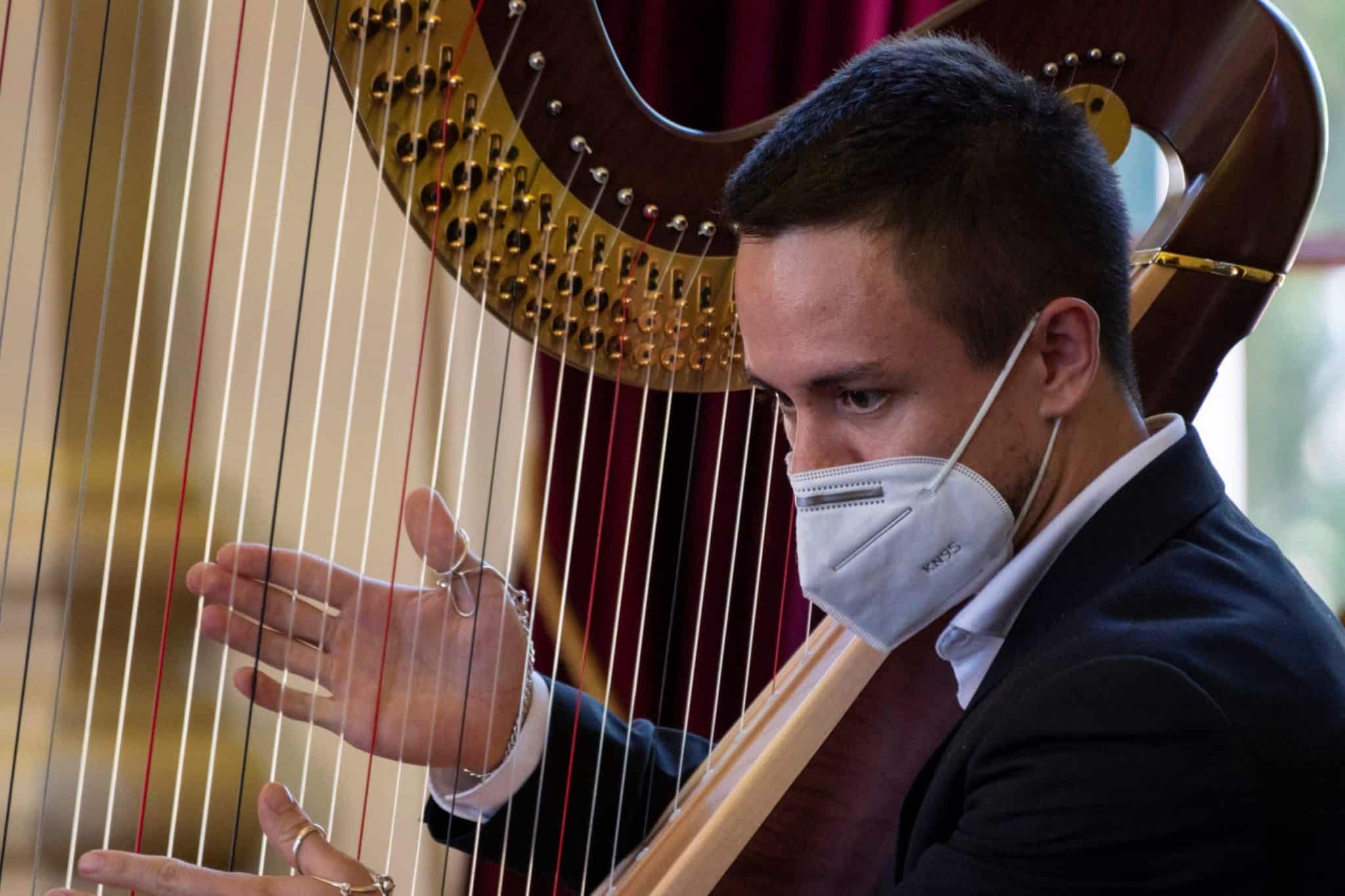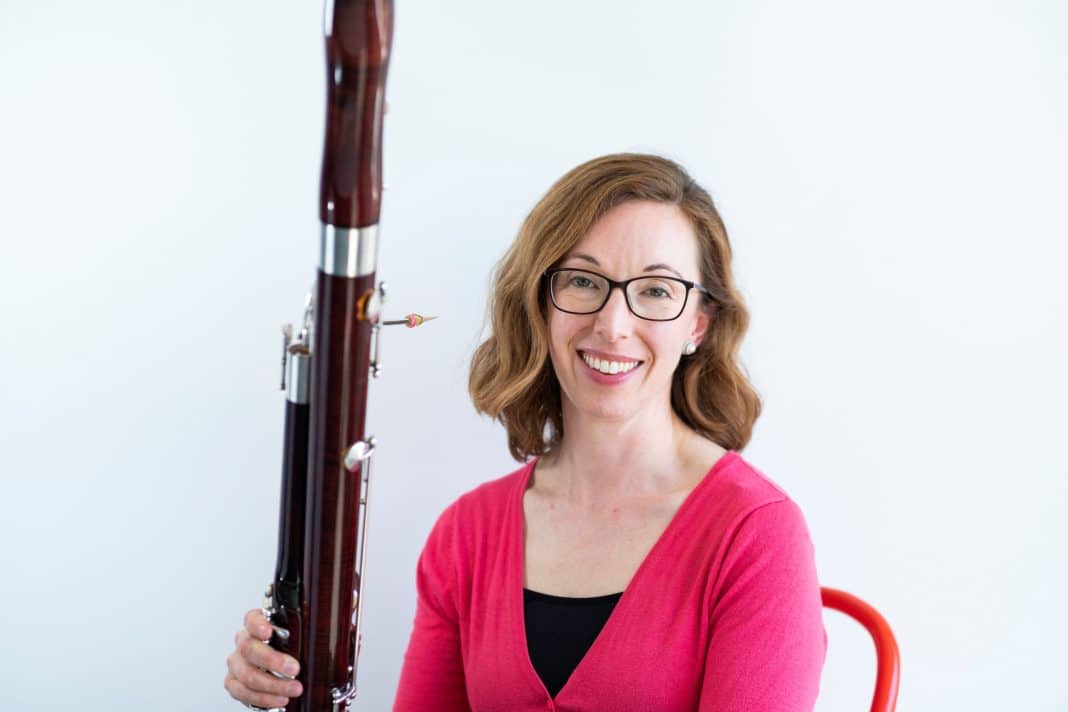Bringing music to everyone who wants it in their lives is important, Canberra Symphony Orchestra bassoonist Kristen Sutcliffe believes. Over the last decade, Ms Sutcliffe, an audiologist in her day job, has put together three community programs, bringing music to people with hearing loss, with dementia, and with autism.
“I love a good orchestra concert; it’s a very important part of our society – but when you take a step back, and go, ‘Hey, we’re helping people here who may have disabilities or other factors at play, who aren’t able to access this music,’ it pulls at my heartstrings.”
Music for people with hearing loss
Ten years ago, she began to curate Rediscovering Music, a specially designed program for people with hearing loss to listen to music and enjoy music again – each year, three concerts for adults (in partnership with Better Hearing Australia), and one activity for children.
One man with cochlear implants, she remembers, stood up at the end of one concert, and said: “Today, I have heard music for the first time in 70 years.”
“There were almost tears in the room,” Ms Sutcliffe recalled. “Everyone was overwhelmed and emotional that it had that impact on him.”
When people get hearing aids or cochlear implants, she said, sometimes music does not sound the same anymore.
“That can be very difficult if music has been an important part of someone’s life to then not be able to enjoy music.”
Participants learn to listen actively to music. Often the concerts feature familiar music – movie scores, or folk songs like Greensleeves – so listeners can latch onto the melody.
Sessions focus on the range and timbre of a particular instrument. The concerts are interactive; participants can ask questions, touch the instruments, feel the vibrations, and see how they work.
“Having that background knowledge means they can feel more confident listening to it,” Ms Sutcliffe said.
The concerts have been through every part of the classical orchestra (twice), but roamed as far afield as jazz, African drumming, and the gamelan (thanks to an ensemble from the Indonesian Embassy earlier this year).
“There’s nothing that we can’t do,” Ms Sutcliffe said.
CSO harpist Rowan Phemister has taught in the program for four years. His first student was an 80-year-old woman with two cochlear implants. Her lifelong goal was to play the harp. Harp strings, he explains, are coloured: C strings are red, and F strings are black or dark blue. That means harpists – even those with hearing issues – can produce quite complex pieces of music, looking at the strings to guide their fingers. Three years later, his student is still playing the instrument.

Deaf children, it is often assumed, cannot enjoy music, but that, according to Ms Sutcliffe, is a misunderstanding. “There is no barrier – if children have hearing loss, they can enjoy music, they can play music.”
On Saturday, she held a concert for deaf children and their parents. Next month, there will be a concert and workshop day for children with moderate or worse hearing loss in both ears; they will listen to a string quartet and make instruments.
Music for people with dementia
In 2019, Ms Sutcliffe started developing a dementia-specific concert series, Music and Memory. She helped design and develop the initial pilot program, with the assistance of Heather Roche, a musician and psychology student.
Musical memory is one of the last facilities to go, Ms Sutcliffe explains: “People might be non-verbal, but play a song they like, and they will sing it.”
Those who have read Rob Wilkins’s recent biography of Terry Pratchett, author of the Discworld novels, may remember a scene where Pratchett, suffering from young-onset Alzheimer’s disease, was visited in his final days by his friend, author Neil Gaiman. Pratchett “barely seemed able to acknowledge that [Gaiman] was in the room”; when Gaiman talked about the past and their work together, Pratchett still “seemed unresponsive”. At last, Gaiman began to sing their favourite They Might Be Giants song, Pratchett joined in, and was soon animatedly chatting.
“I’ve had people say to me afterwards: ‘Oh, gosh, I wish this program was around when my mum or dad or grandma or grandfather had dementia’,” Ms Sutcliffe said. “Because they might find it difficult to go in to visit them and have something to talk about. Music is a way of bringing people together and increasing that quality of life.”
As part of the program, Mr Phemister plays in aged care facilities to people who were involved in music in some way in the past – as musicians, teachers, or concert goers. He will run through 20 pieces in 45 minutes – short excerpts from famous works (Rossini’s Barber of Seville overture, Bach, Mozart), or beginner pieces for instruments – in the hope that the listener will remember one of the pieces. One woman, he remembered, seemed to be asleep, but staff noticed her fingers moving, her body remembering when she had been a cellist.
The program also gives patients someone they can talk to about what they did in the past, Mr Phemister says. One woman had been head of music at Girls’ Grammar, where he teaches now. They connected over their common experience, discussing what the school had been like.
“Spending time with them, hearing their stories – that’s what they’re really looking for,” he said.
Music for people with autism
Now, Ms Sutcliffe is working with the CSO on autism-friendly performances in Canberra schools.
Going to concerts can be too much for people on the spectrum, due to potential sensory overload, and difficulties within a quite stilted environment, she explains. These concerts are a friendly and relaxed way for children with autism to enjoy music, and to break down barriers to music. They source old, broken instruments so children can handle them; if they drop an old clarinet, who cares?
The CSO already delivers concerts every year to four special education schools; she wanted units in mainstream schools to get the same exposure to music.
The children love it. After one concert last week, one little girl went home, and excitedly told her mother: “Music is my life!”
The program was trialled before the pandemic and is starting up again after COVID. Next year, she wants to grow the program to teenagers and young adults.
Mr Phemister has also played at the Canberra Hospital – once in the foyer, once in the oncology department. Staff, he said, thanked him for bringing something beautiful into their everyday lives, and for helping patients having a difficult time.
Music, he said, brought “uplift”. He and an oboeist colleague will perform a duet at Canberra Hospital soon, while he is also involved in an art therapy program for people with Parkinson’s Disease.
The CSO, Mr Phemister said, “brings really beautiful music to the community, often through the concert hall. This is the same thing, but in a different kind of space.”
Ms Sutcliffe hopes that philanthropic donors will be able to help the CSO deliver these programs.
“The more funds we have, the more people we can reach. It is so important. We want to be able to get [music] out there to everyone.
“Some people might love music, but they can’t get to it, for whatever reason. It might be due to mobility; it might be due to disability; it might be due to financial constraints. What I love about our community programs is that we try to break down these barriers to be able to deliver it to everyone who wants [music].”
Get local, national and world news, plus sport, entertainment, lifestyle, competitions and more delivered straight to your inbox with the Canberra Daily Daily Newsletter. Sign up here.



